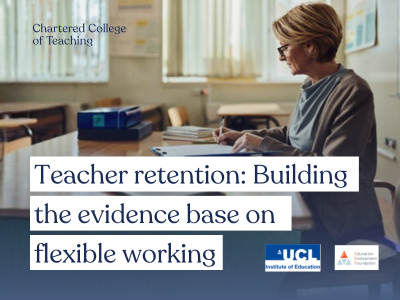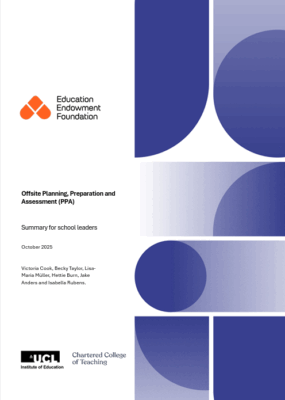Teacher retention is a significant challenge for schools in England. Recent data suggests that only 67% of teachers are still in service five years after qualifying and only 57% after ten years (DfE, 2025).
There is a widespread perception among teachers, school leaders and policymakers that increasing the availability of flexible working could improve teacher retention. However, there is currently limited evidence as to what works in schools (Harland et al., 2023; Taylor et al., 2023).
Taking Planning Preparation and Assessment (PPA) time away from the school site has been proposed as one possible solution to the teacher retention crisis. But is it? The Chartered College of Teaching, in conjunction with UCL Institute of Education, has undertaken research funded by the Education Endowment Foundation (EEF) to understand more about offsite PPA in primary and secondary schools. We ran online surveys, focus groups and interviews with primary leaders and teachers and conducted workshops with individuals responsible for timetabling in secondary schools. So, what did we find?

Offsite PPA in primary schools
Our findings suggest that offsite PPA is valued by teachers. Teachers spoke about having greater control over their workload and choice of working environment, which they perceived to impact both their productivity and wellbeing. For example, teachers described choosing to work in quieter and more comfortable spaces where they would receive fewer interruptions. Teachers also told us that having a choice over the timing and place of their work makes them feel trusted as professionals by their school leaders. Leaders who have chosen to offer offsite PPA explained that this was mainly due to a lack of dedicated PPA space onsite, a drive to improve staff wellbeing and a commitment to demonstrating professional trust in their staff. Offering offsite PPA also requires flexibility from both leaders and teachers as part of a transparent approach to offering offsite PPA. Examples of flexible approaches adopted in schools include adjusting meeting times and supporting remote collaboration.
However, in some schools offsite PPA is only offered on a discretionary basis, meaning that it is not freely available to all teachers. Other schools may choose not to offer offsite PPA at all if they are unable to offer it to all staff. Other barriers to offering offsite PPA include protecting PPA time in schools, budget constraints and coordinating in-person meetings.
Offsite PPA in secondary schools
Offsite PPA is currently much less common in secondary schools. A Teacher Tapp survey of primary (n = 3,219) and secondary (n = 6,395) teachers in September 2024 found that 33% of primary teachers surveyed were allowed to do their PPA from home compared to only 9% of secondary teachers surveyed.
Our findings suggest that the main barriers to offsite PPA in secondary schools appear to be a desire to spread PPA throughout the week (as opposed to block timetabling PPA at the beginning or end of the school day) and a drive to minimise split classes. Furthermore, in the secondary schools that we spoke to, PPA is usually timetabled last. For this to change, it is likely that significant additional resourcing would be required.
What’s next?
These findings offer valuable insights into the complexities of offering teachers the possibility to take their PPA time offsite. Given the limited evidence as to what works in schools, it is important that we continue to build the evidence base on flexible working before jumping to conclusions or making recommendations about its potential impact on teacher retention and wellbeing. Having completed the first stage of the research, we are now assessing the feasibility of proceeding to an impact evaluation to assess the impact of offsite PPA on teacher retention and wellbeing. Watch this space.
You can read the full report here.
DfE (2025) ‘School Workforce in England’, London: Department for Education. https://explore-education-statistics.service.gov.uk/find-statistics/school-workforce-in-england/2024
Harland, J., Bradley, E. and Worth, J. (2023) ‘Understanding the Factors that Support the Recruitment and Retention of Teachers—Review of Flexible Working Approaches: Mixed Methods Review’, London: Education Endowment Foundation. https://d2tic4wvo1iusb.cloudfront.net/production/documents/projects/Review-of-flexible-working-approaches.pdf?v=1706693629
Taylor, B., Hardman, M., Riordan, S., Pillinger, C. and Moss, G. (2023) ‘Teacher Quality, Recruitment and Retention, Rapid Evidence Assessment’, London: Education Endowment Foundation. https://d2tic4wvo1iusb.cloudfront.net/production/documents/Teacher-quality-recruitment-and-retention-lit-review-Final.pdf?v=1706695184
Teacher Tapp (2024) Blog, 24 September: ‘PPA, Smiling Teachers and Classroom Disruptions’.


